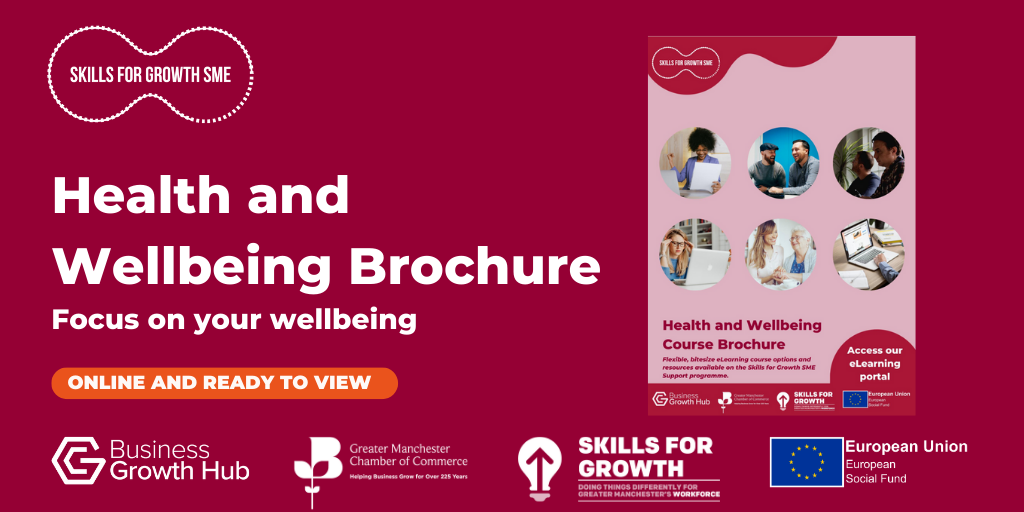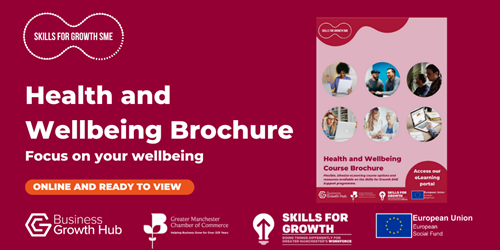Skills for Growth - SME Support is a fully funded, tailored service to help upskill your employees and improve business productivity.
The three words that can make a huge difference to workplace wellbeing
How are you?
As we progress through Mental Health Awareness Week (15th – 21st May), we’re focusing on the importance of prioritising Health and Wellbeing in the workplace. As one of the greatest assets of the business, the workforce is at heart of activity and is central to the success of many businesses, especially SMEs, so consideration for their physical, mental and financial wellbeing is paramount.
The Cost-of-Living crisis has put additional pressure on both businesses and their workforce. As a result, workplace wellbeing is front of mind as SMEs look to support employees and nurture talent by concentrating on workplace culture, strategy and framework.
Assess the Current Position
Do you have wellbeing strategy? Do you have an open-door policy? Do you regularly communicate with your team?
Employees who feel supported, informed, and included are more likely to share concerns and worries. By taking the time to understand your workplace culture and landscape, you can identify how to support, nurture, and inspire your team. Conducting an anonymous survey can provide valuable insight and feedback to assist with the development of a wellbeing strategy and the best approach to engaging with your team. Check out the recommended areas to focus on to improve your workplace wellbeing.
Focus Areas
- Communication is Key
Start conversations, ask the question “How are you?”, these three words can ignite a channel of communication and insight - you don’t know what is going on with someone unless you engage with them on a regular basis. - Be Accessible
Establish the right environment to engage and have conversations in the first place. Break down any barriers and look to appoint Wellbeing Champions who are approachable, trustworthy, and comfortable having conversations with their colleagues. - Lead the Way
Leaders inspire, motivate, and lead the way. Stay in tune and build trust with the workforce by making a conscious effort to be amongst the team. - Signpost to External Support
Take the time to audit the support that you have got available within your business; Wellbeing Champion, Mental Health First Aider, Employee Assistance Programme, and signpost to external support for the areas that you are unable to fulfil.
How Skills for Growth – SME Support can help you
Delivered by the GC Business Growth Hub, The Skills for Growth – SME Support programme is focused on identifying and filling occupational skills gaps in Greater Manchester’s SMEs. With access to over 400 fully funded courses, bitesize e-learning and dedicated Skills Coach support, there are options available for all areas, all industries, and all futures.
Fully Funded Training Options
With options covering Leadership, Management, Communication, the ability to upskill and develop in these areas can improve the skills that can assist with improving the workplace wellbeing and culture. Find out more about the GM Skills Map, Greater Manchester's dedicated online training portal, featuring all the fully funded, part funded and commercial courses available. GM Skills Map
Bitesize ‘E’ Learning
There’s Health and Wellbeing, Financial Planning and Communication courses on the bitesize ‘E’ Learning platform. These flexible on-demand courses can improve soft skills and be accessed at any time and on any device, giving the learner full control of the courses that they want to complete. Discover more about the benefits of Bitesize 'E' Learning
Signposting to Health and Wellbeing Support
Our newly launched Health and Wellbeing brochure, gives learners a taste of the Health and Wellbeing options available but also signposting to further support available in Greater Manchester. Health and Wellbeing Brochure


Don't Miss Out, Programme Deadline Approaching
To find out more about how we can work with you to equip your business with the Skills for Growth, please choose from the below three options.
- Fill in the expression of interest form here
- Call us on 0161 237 4444
- Send an email to enquiries@skillsforgrowthsme.co.uk
Once eligibility is confirmed you will be allocated to a dedicated Skills Coach who will support you and your staff to find the best options available for your needs.
(To be eligible you must have a trading address in Greater Manchester, employ less than 250 employees and generate a financial turnover amount below €50 Million).
